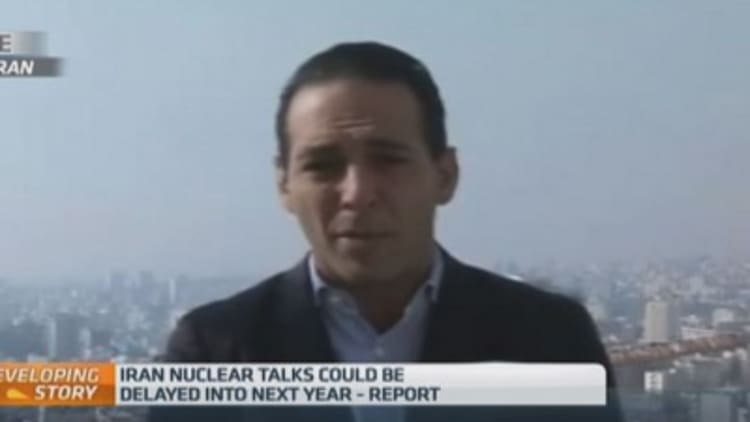World powers are hoping to reach agreement over Iran's nuclear program on Monday -- in spite of analysts and officials involved in negotiations voicing their pessimism that an agreement can be found by then.
Talks between Tehran and the so-called P5+1 group, which comprises the five permanent members of the UN Security Council (China, Russia, France, the U.K. and the U.S.) plus Germany are ongoing in Vienna.
The countries aim to have assurances from Iran that it will not enrich uranium in order to create a nuclear bomb, in return for the relaxation of international sanctions, an accusation Iran denies.
Just days before the deadline, however, little progress appears to have been made. Iran's foreign minister Mohammad Javad Zarif said on Tuesday that "excessive demands" by the West could mean there is no deal at the end of long-running talks.
The deadline could be extended from Monday until March because of sharp disagreements between Tehran and world powers, officials close to the talks said on Thursday, according to a Reuters report.
Although both Iran and the West are keen to strike a deal, Firas Abi Ali, senior manager of Middle East and North Africa Country Risk at IHS told CNBC that there wouldn't be a deal at any cost.
Read MoreIran's economy moving from bad to less bad
"There's political will on both sides not to make these talks into a failure," Abi Ali told CNBC Thursday, "[Iranian President] Hassan Rouhani has staked a lot on his ability to stimulate the economy and open up investment to the West so he's not keen to let these talks fail completely. Similarly with President Obama there are expectations on him not to fail…but that doesn't mean the West will accept a bad deal."
"I think there will be some very carefully worded diplomatic language from both sides to make it not look like talks have failed anyway."
Talks with Iran have been intermittent since January. As the deadline approaches, significant differences remain between the parties over Iran's uranium enrichment allowance and how fast – and in what order --sanctions by the West would be lifted.
Other officials involved in the talks have also shown reservations over the outcome, with Britain's Foreign Secretary Philip Hammond saying on Wednesday that he was not optimistic a deal could be struck by the deadline. He told reporters in London: "But I think if we make some significant movement we maybe able to find a way of extending the deadline to allow us to get to the final deal."
IHS' Abi Ali also believed that rather than a conclusive deal, a framework or "an agreement to reach an agreement" would be the outcome. "The November 24 deadline was a self-imposed one from the start so I think they have some leeway. They will want to exhaust that."

Iran and the oil
For Iran, a good outcome would be to splinter the coalition of Western partners that has imposed sanctions on them, Abi Ali added. This was a possibility, particularly as European members of the UN Security Council are worried about their energy dependence on Russia, and see Iran's supplies as a potential alternative.
The European Union banned allIranian crude oil imports in 2012 and countries including China, Japan, India reduced imports, hitting the country hard. Iran is the world's fourth-and second-largest reserve holder of oil and natural gas respectively, according to the U.S. Energy Information Administration, and is heavily dependent on oil exports for much of its revenues.
Read MoreIran a 'time bomb' for oil prices
Even without Iran's oil supply on the market and the ongoing threat of terrorist group ISIS in the Middle East, however, the price of Brent crude has dropped more than a quarter since June amid an over-supplied global market.
Nomura's senior political analyst Alastair Newton said in a note on Tuesday that the outcome of the nuclear negotiations was "far from clear," and that posed more oil price uncertainty.
"The consensus among experts appeared to be that the probability of success is no more than one in three, not least thanks to the complexity of the issues on the table not only individually but also – perhaps especially – in their interrelationships." Newton believed there was a 50:50 chance of success.
Although there was a possibility that a framework for agreement could be reached by the 24th, with an extension granted for thrashing out the details, Newton said that if talks failed the price of oil could be further affected. Brent has hovered around the $80 per barrel (pb) in the week leading up to the deadline.
"Saudi Arabia is closely watching the developments in the nuclear talks with Iran," Newton said, as it continues to ponder what line to take (and importantly, whether to cut output)at the Organization of Petroleum-Exporting Countries (OPEC) meeting on 27 November.
- By CNBC's Holly Ellyatt, follow her at Twitter @HollyEllyatt.


